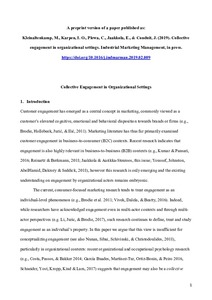Collective engagement in organizational settings
Michael Kleinaltenkamp; Ingo Karpen; Carolin Plewa; Elina Jaakkola; Jodie Conduit
https://urn.fi/URN:NBN:fi-fe2021042825081
Tiivistelmä
Customer engagement has emerged as a central concept in marketing. Despite extensive scholarly investigations and managerial interest though, considerations of customer engagement and emotional connections in business marketing have been scant. Researchers tend to focus on individual-level engagement, which is conceptually inadequate to address the inherently multi-actor nature of business-to-business marketing. Therefore, this article introduces the concept of collective engagement, highlighting both its characteristics and the conditions for its emergence. The resulting theoretical framework, with ten propositions, outlines the multidimensional nature of collective engagement, including its multiplicative aggregation, multidirectional valence, phenomenological and shared properties, emotional and institutional interdependence, and emergence in dynamic and multichannel settings. Collective engagement also offers a mechanism for considering emotions in business marketing, a topic that thus far has been largely ignored by the prevalent rational choice paradigm. Thus, this article contributes a systematic, coherent conceptualization of collective engagement and advances the theoretical domains of customer and actor engagement in particular and business-to-business research in general, while also suggesting a detailed research agenda.
Kokoelmat
- Rinnakkaistallenteet [29335]
